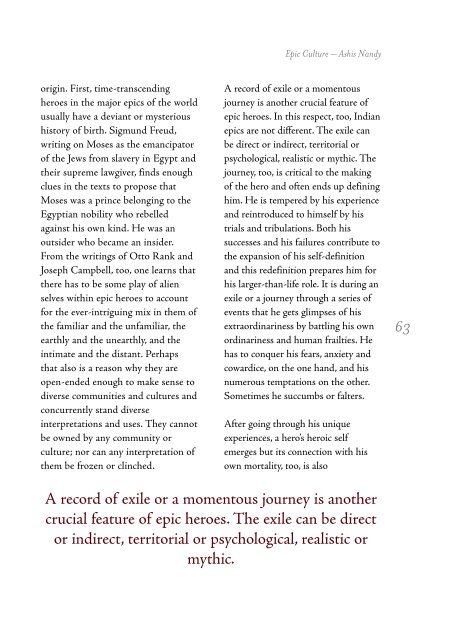Layout 3 - India Foundation for the Arts - IFA
Layout 3 - India Foundation for the Arts - IFA
Layout 3 - India Foundation for the Arts - IFA
You also want an ePaper? Increase the reach of your titles
YUMPU automatically turns print PDFs into web optimized ePapers that Google loves.
origin. First, time-transcending<br />
heroes in <strong>the</strong> major epics of <strong>the</strong> world<br />
usually have a deviant or mysterious<br />
history of birth. Sigmund Freud,<br />
writing on Moses as <strong>the</strong> emancipator<br />
of <strong>the</strong> Jews from slavery in Egypt and<br />
<strong>the</strong>ir supreme lawgiver, finds enough<br />
clues in <strong>the</strong> texts to propose that<br />
Moses was a prince belonging to <strong>the</strong><br />
Egyptian nobility who rebelled<br />
against his own kind. He was an<br />
outsider who became an insider.<br />
From <strong>the</strong> writings of Otto Rank and<br />
Joseph Campbell, too, one learns that<br />
<strong>the</strong>re has to be some play of alien<br />
selves within epic heroes to account<br />
<strong>for</strong> <strong>the</strong> ever-intriguing mix in <strong>the</strong>m of<br />
<strong>the</strong> familiar and <strong>the</strong> unfamiliar, <strong>the</strong><br />
earthly and <strong>the</strong> unearthly, and <strong>the</strong><br />
intimate and <strong>the</strong> distant. Perhaps<br />
that also is a reason why <strong>the</strong>y are<br />
open-ended enough to make sense to<br />
diverse communities and cultures and<br />
concurrently stand diverse<br />
interpretations and uses. They cannot<br />
be owned by any community or<br />
culture; nor can any interpretation of<br />
<strong>the</strong>m be frozen or clinched.<br />
Epic Culture – Ashis Nandy<br />
A record of exile or a momentous<br />
journey is ano<strong>the</strong>r crucial feature of<br />
epic heroes. In this respect, too, <strong>India</strong>n<br />
epics are not different. The exile can<br />
be direct or indirect, territorial or<br />
psychological, realistic or mythic. The<br />
journey, too, is critical to <strong>the</strong> making<br />
of <strong>the</strong> hero and often ends up defining<br />
him. He is tempered by his experience<br />
and reintroduced to himself by his<br />
trials and tribulations. Both his<br />
successes and his failures contribute to<br />
<strong>the</strong> expansion of his self-definition<br />
and this redefinition prepares him <strong>for</strong><br />
his larger-than-life role. It is during an<br />
exile or a journey through a series of<br />
events that he gets glimpses of his<br />
extraordinariness by battling his own<br />
ordinariness and human frailties. He<br />
has to conquer his fears, anxiety and<br />
cowardice, on <strong>the</strong> one hand, and his<br />
numerous temptations on <strong>the</strong> o<strong>the</strong>r.<br />
Sometimes he succumbs or falters.<br />
After going through his unique<br />
experiences, a hero’s heroic self<br />
emerges but its connection with his<br />
own mortality, too, is also<br />
A record of exile or a momentous journey is ano<strong>the</strong>r<br />
crucial feature of epic heroes. The exile can be direct<br />
or indirect, territorial or psychological, realistic or<br />
mythic.<br />
63


